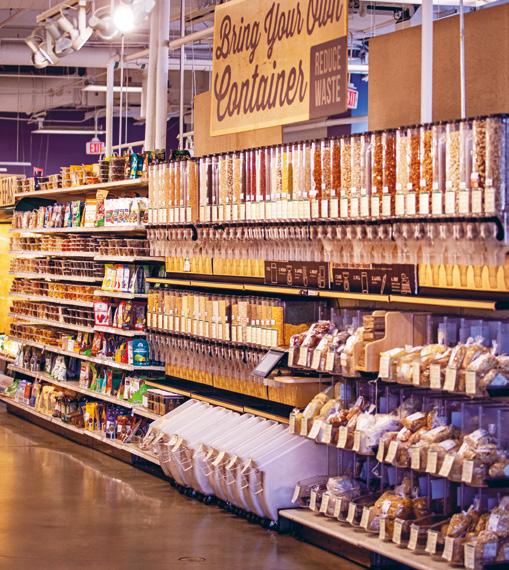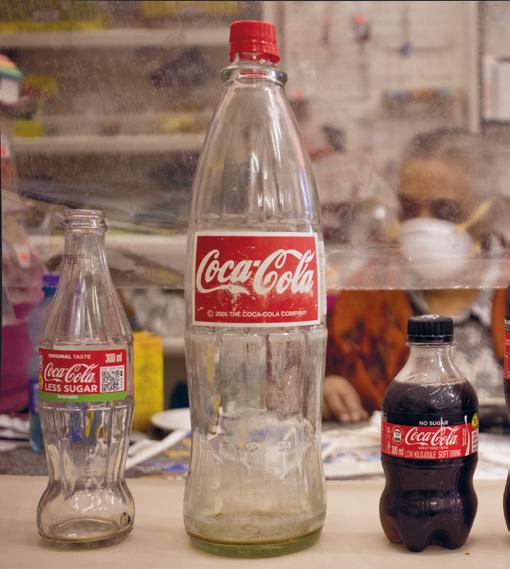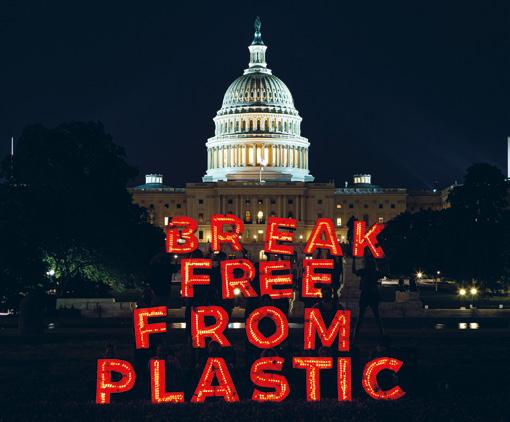
6 minute read
BIG BRANDS MUST SHIFT TO REUSE TO STOP THE PETROCHEMICAL EXPANSION AND MEET CLIMATE GOALS
Clearly, given the detrimental impacts to communities and the need to keep climate change below 1.5 °C, the fossil fuel industry cannot be allowed to continue expanding petrochemical production to make plastic.
The consumer goods sector has a clear choice to make: Companies can rapidly move away from single-use plastic and seriously invest in reuse and packaging-free based delivery systems, or they can continue to enable the fossil fuel industry’s attempts to ramp up plastic production behind the smokescreen of recycling.
Advertisement
Among progressive businesses, governments and nongovernmental organizations, there is already a consensus that our current linear economic model with its “take, make, dispose” philosophy must be abandoned in favor of a circular model that decouples economic activity from the consumption of finite resources and designs waste out of the system. Reuse will be central to such a slow circular economy, with recycling confined mainly to dealing with reusable packaging that has reached the end of its life.
However, while some major FMCG companies have acknowledged the need to either avoid packaging altogether or replace single-use packaging with containers that can be reused a large number of times,294 to date not one has committed to targets for large-scale reuse or significant reduction of single-use plastic packaging. For instance, big brands like Coca-Cola, Nestlé and PepsiCo
have all made high-level pledges to tackle plastic pollution that focus on recycling, while in reality these companies and others in the sector have made very
little progress on reducing throwaway plastic. In fact, a 2020 review of action by companies signed up to the Ellen McArthur Foundation Global Plastics Commitment found that plastic packaging use by signatories actually grew by 0.6% in 2019 and that reusables accounted for just 1.9% of their packaging, up just 0.1% from the previous year.295
Instead, most brands continue to propose plastic recycling as the central solution to the plastic pollution crisis, even though there is abundant evidence of its failure. This is despite the fact that multiple studies have shown
that reusing packaging is far less carbon-intensive than
relying on single-use packaging. For instance, one lifecycle assessment study estimated that if the glass bottles used in the food and drinks packaging sector were reused by up to three times, it would save approximately 50,000 metric tons of CO2e per year. 296
It’s time for these big brands to shift direction – to reduce both their dependence on oil and gas and their plastic footprints and move beyond the throwaway
culture that single-use plastic exemplifies – by investing in reuse- and packaging-free–based delivery systems and other innovations. Governments must encourage, assist and, where necessary, compel them to act.
GREENPEACE IS CALLING ON FMCG COMPANIES TO TAKE THE FOLLOWING STEPS:
MOVE QUICKLY TO ALTERNATIVE DELIVERY SYSTEMS BASED ON REUSE
• Set reuse targets of at least 25% reusable packaging by 2025 and 50% by 2030.297 Sectors for which a switch to reuse is comparatively easy – such as soft drinks, mineral water, alcoholic beverages and coffee chains – should set more ambitious targets than this.
PHASE OUT ALL SINGLE-USE PLASTIC
• Phase out all single-use plastic (packaging298 and products299), not just “virgin” or “new” plastic. • Prioritize elimination of unrecyclable/hard-to-recycle plastics300 and produce a roadmap for phasing them out by the end of 2022.
WORK TOGETHER
• Collaborate with packaging manufacturers and retailers (and, pre-competitively, with other FMCG companies) to standardize reusable packaging and build shared reuse systems and infrastructure (e.g. return logistics, washing facilities, tracking technology). • Publicly share learnings on reuse for the benefit of other companies in the sector and other stakeholders (e.g. packaging manufacturers, retailers, legislators). • Collaborate to address the drivers of single-use packaging. Promote shorter supply chains and seasonal produce, and challenge use of excessive packaging for marketing purposes, along with the wasteful “convenience” culture exemplified by the “on-the-go” market.
BE TRANSPARENT AND CONSISTENT
• Implement annual public reporting of independently verified and comprehensive data about the company’s packaging, including its single-use packaging climate footprint (taking account of the entire life cycle of the plastic used), reduction of packaging and uptake of reusable packaging. • Ensure that packaging reduction and reuse commitments are enacted consistently across all markets in which the company (and its subsidiaries) operates.
ADVOCATE FOR POLITICAL ACTION
• Advocate for an ambitious Global Plastics Treaty that will address the entire plastics life cycle and emphasize the need to reduce plastic production and eliminate single-use plastic. • Advocate for ambitious regional and national legislation to promote the slow circular economy and extended producer responsibility, ban single-use plastic and fast-track reuse and packaging-free systems. • Avoid and/or terminate alliances with companies or organizations that lobby against action to eliminate single-use plastic.
20 December, 2020 Lenasia, South Africa. Reusable glass and plastic Coca-Cola bottles. © Dillion Jacobs / Greenpeace

3 March 2021, Washington DC. A supermarket with bulk items, an effort to reduce single use plastics. © Tim Aubry / Greenpeace


16 April 2019, Italy, Stop plastic action at San Pellegrino Nestlé Plant. © Francesco Alesi / Greenpeace 22 May 2021, Washington DC. A Break Free From Plastic message lights up the night near the U.S. Capitol Building. © Tim Aubry / Greenpeace
GREENPEACE IS CALLING ON LOCAL AND NATIONAL GOVERNMENTS TO TAKE THE FOLLOWING STEPS:
ADVOCATE FOR INTERNATIONAL ACTION
Treaty that will address the entire plastics life cycle and emphasize the need to reduce plastic production and eliminate single-use plastic. • Support bans on the plastics waste trade.
MOVE TOWARD A ZERO-WASTE ECONOMY
• Adopt a zero-waste approach that progressively reduces waste generation. Act to reduce landfilling of waste and eliminate its incineration and export altogether. • Make building a zero-waste, reuse-centered economy a central part of plans for a green recovery from the coronavirus pandemic, starting with investments enabling the creation of stable, highquality employment and ensuring a just transition for workers in the fossil fuel, petrochemical/plastic and waste sectors (including waste-picker communities where present).
ENCOURAGE A PHASE-OUT OF SINGLE-USE PLASTIC VIA LEGISLATION AND POLICY MEASURES
• Set legally binding, time-bound national/local targets to phase out all single-use plastic, with the exception of essential single-use medical supplies. • Design and implement extended producer responsibility legislation that prioritizes packaging reduction and uptake of reusables by financially penalizing companies that continue to sell single-use products and incentivizing the transition to reuse and packaging-free models. • End all fossil fuel subsidies and immediately suspend permitting of both petrochemical expansion intended to supply the plastic industry, as well as waste-to-fuel and waste-to-energy plants.
ENCOURAGE ADOPTION OF REUSE AND PACKAGING-FREE SYSTEMS VIA LEGISLATION, INVESTMENT AND POLICY MEASURES
• Set legally binding, time-bound targets for specific sectors (e.g. beverages, food, e-commerce) to adopt reuse or packaging-free systems. • Invest in systems that incentivize reuse, such as depositreturn schemes. • Incentivize and support standardization ofreusable packaging and provide financial incentives to help businesses shift to reuse and packaging-free approaches. • Adopt public procurement policies that prioritize reusebased or packaging-free services and products.
ENSURE INVOLVEMENT OF AFFECTED COMMUNITIES
• Ensure Black, Brown, Indigenous, low-income and other frontline communities impacted by any stage in the plastic production process (including fossil fuel extraction and refining), or by plastic recycling, incineration and disposal, have opportunities to contribute to the design of a slow circular economy and to benefit from that economy. When anti-plastic and pro-reuse legislation is developed in countries with informal waste-collection sectors, it is important that it be context-specific and actively include wastepicker communities in its development.











